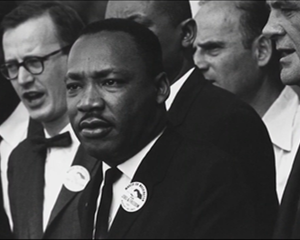(单词翻译:单击)
听力文本
JUDY WOODRUFF: In recognition of Black History Month, tonight's Brief But Spectacular comes from historian Daina Ramey Berry, who chairs the History Department at the University of Texas at Austin. She's dedicated to rethinking the way we teach American history to students of all ages. Her latest book is called "A Black Women's History of the United States."

DAINA RAMEY BERRY, University of Texas at Austin: I have a son who's now in his teen years. His first racial experience was at age 3. We had just moved to Austin, Texas, and we ran a neighborhood meeting about the community we were in. We were the only Black family that were there. And my son comes downstairs at 3 years old, and he was pouting. I said "What's wrong, honey?" He said: "They told me I had to be the bad guy because I'm Black." And he said: "And I want to be the good guy. I want to be the hero. And I want to be the one that saves people." The mothers were frozen. They didn't even know what to say. It was totally uncomfortable for me after that. I didn't want to leave the meeting, because I wanted my son to know that we're going to stand there and we're going to still be there and that he can be who he wants to be. And so, that night, when we talked to him, when my husband and I talked to him about who he comes from and the people, just like my parents told me so much about African American history and culture as a child, because, outside of our house setting, our home setting, we are criminalized. When I was growing up, African American history was literally one paragraph. There were -- Africans came and they were enslaved. There was Harriet Tubman, Frederick Douglass, and then a jump to Rosa Parks and Martin Luther King. We learned about four people in African American history. Now, where I sit and I know that four million people received their freedom, or took their freedom, or were granted their freedom, stole their freedom in 1865 and even before that moment, there's so many stories that we can understand about survival, about resilience, about pride, and about the African American experience in the United States that goes beyond those four great figures. Teaching Texas Slavery is a digital humanities project that I have been working on with a team of scholars for a number of years. And this project is a way to teach young children about the contributions of African Americans, to look at them in their eyes, to understand the humanity of the enslaved and their contributions to the state of Texas. In my work, I try to honor the voices and experience of people who were enslaved, because, for so long, in the historical literature, nobody asked them about how they experienced slavery. They talked about enslaved people by making them objects. But these were human beings. And, for me, I think it's important to try to read and think about moments, historical moments from their perspectives. Kids can absolutely handle hard truths. Some of the best conversations that I have had about history and about the history of slavery have been with 5-year-olds, 7-year-olds, 9-year-olds. It is so important that we know our history, that we teach all aspects of history, even the tough parts, the subjects that make us uncomfortable, the subjects that make us feel ashamed about our nation. That's when we are in a place where we can move forward and grow and live in a realistic space. And students don't feel betrayed by high school education, by junior high school education, and by elementary school education. My name is Daina Ramey Berry, and this is my Brief But Spectacular take on understanding the past to live a better future.
JUDY WOODRUFF: And you can find all of our Brief But Spectacular segments online at PBS.org/NewsHour/Brief.
重点解析
1.in recognition of 表扬
This award is given to you in recognition of your good performance.
因你出色的表演,我们将这个奖颁发给你。
2.dedicate to doing 致力于做
Countries in the world dedicate to researching into new fire protection technologies.
世界各国都在致力于新的消防技术的研究。
3.junior high school 初中
After junior high school he went to a trade school where he learned to be an auto mechanic.
初中毕业以后,他上了中等技术学校,在那里他学成为一名汽车修理工。
4.criminalize 把……当罪犯对待
On 28 September, it adopted a wide-ranging resolution under the enforcement provisions of the UN Charter to prevent the financing of terrorism, criminalize the collection of funds for such purposes, and immediately freeze terrorist financial assets.
9月28日,安理会根据《联合国宪章》的强制执行规定,通过了一项内容广泛的决议,旨在防止向恐怖主义提供资金,将为此目的筹集资金定为犯罪行为,并立即冻结恐怖分子的金融资产。
5.enslave 奴役
They applied the carrot and stick to enslave the people in the colonies.
他们使用胡萝卜加大棒的手段来奴役殖民地人民。
参考译文
朱迪·伍德乐夫:为了赞颂“黑人历史月”,今晚“短而精彩”演说的主角是来自德克萨斯大学奥斯汀分校历史系主任、历史学家戴娜·雷米·贝瑞。她致力于重新思考我们向各个年龄段的学生教授美国历史的方式。她的新书名为《美国黑人女性的历史》。
黛娜·雷米·贝瑞,德克萨斯大学奥斯汀分校:我有一个儿子,现在已经十几岁了。他的第一次种族经历是在3岁的时候。当时我们刚搬到德克萨斯州的奥斯汀市,我们组织了一次关于我们所在社区的社区会议。我们是那里唯一的黑人家庭。他3岁的时候有一次撅着嘴下了楼,我说:“怎么了,亲爱的?”他说:“他们告诉我我必须当坏人,因为我是黑人。”他说:“但是我想做个好人,我想成为英雄,我想成为那个拯救人类的人。”这种时候妈妈们往往会僵住,她们不知道该说什么。在那之后我非常不舒服。我不想离开会议,因为我想让我儿子知道我们会站在那里,我们还会在那里,他可以成为他想成为的人。那天晚上,当我们对他说,当我丈夫和我跟他谈起他的出身和种族时,就像我小的时候我的父母跟我讲很多关于非裔美国人的历史和文化一样,因为,我们一旦出了家门就会被别人看成是罪犯。在我成长的过程中,非裔美国人的历史只有一段:非洲人来了,他们被奴役。有哈丽特·塔布曼,弗雷德里克·道格拉斯,然后是罗莎·帕克斯和马丁·路德·金。我们都知道非裔美国人历史上的四个人物。现在,我坐在这里,我知道1865年有四百万人因他们而获得了自由、或者说是拿走了他们的自由、或者说是被授予了自由、偷走了他们的自由。甚至在那一刻之前,有很多关于生存的故事、关于坚韧的故事、关于骄傲的故事、关于非裔美国人在美国的经历的故事、这些故事远远超过了这四位伟大人物的故事。“德克萨斯奴隶制教学”是一个我和一群学者已经合作多年的数字人文项目。这个项目是一种让孩子们了解非裔美国人贡献的方式,让他们看着他们的眼睛,理解奴隶们的人性以及他们对德州的贡献。在我的作品中,我试图尊重那些被奴役的人的声音和经历,因为在很长一段时间里,在历史文献中,没有人问过他们是如何经历奴役的。他们把被奴役的人当作物品来谈论,但这些都是人。对我来说,我认为从他们的角度去阅读和思考历史时刻是很重要的,孩子们完全可以接受残酷的事实。我和5岁、7岁、9岁的孩子进行过一些关于历史和奴隶制历史的最好的对话。了解我们的历史太重要了,我们会教授历史的各个方面,甚至是很艰难的时期,那些让我们感到不舒服的科目,那些让我们为我们的国家感到羞耻的科目。我们会就这样在一个地方,在一个现实空间里一起前进、生长和生活。学生们不会觉得被高中教育,初中教育和小学教育背叛了。我是黛娜·雷米·贝瑞,这是我的“短而精彩”演说:通过对过去的了解来创造更美好的未来。
朱迪·伍德乐夫:大家可以在PBS.org/NewsHour/Brief网站上找到我们的“短而精彩”演说板块。
译文为可可英语翻译,未经授权请勿转载!


